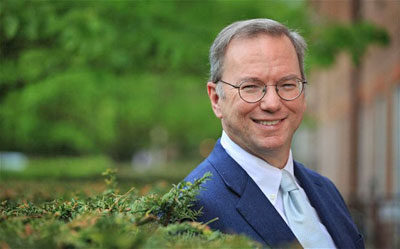|
|
|
from
TheTelegraph Website
Photo: Rii Schroer
What is the future of the online world? Robert Colvile meets Google's executive chairman Eric Schmidt,
the man who knows the answer.
Rather than standing on dignity, Eric Schmidt
is happy to comply, shifting his weight deeper into the foliage with
avuncular nonchalance, before calling over his co-author for a shared
arboreal encounter.
But then, Schmidt is hardly a typical billionaire. In 2001, the software executive was recruited by Google’s young founders, Larry Page and Sergey Brin, to run the hottest start-up in Silicon Valley.
After a decade as Google’s CEO - during which it
grew into an internet-dominating behemoth - Schmidt stepped upstairs to
become executive chairman, serving as the company’s public face, ambassador
and general plenipotentiary, as well as sitting on both David Cameron and
Barack Obama’s business councils. If the hedgerows have left an impression,
he can certainly afford the dry cleaning bills.
For one thing, there’s The New Digital Age, the book he’s in Britain to publicize - first at Google’s exclusive Zeitgeist conference (described by the company as an “intimate gathering of top global thinkers and leaders”, whose ranks have included everyone from Bill Clinton to Arsène Wenger) and then at the Telegraph Hay Festival.
Absolutely, I reassure him. He seems pleased.
The book is littered with references to exotic
locations, such as Kabul and Baghdad (where Schmidt was among the first
visitors after the Iraq War). When, in the course of our conversation, Cohen
nominates Chad as the world’s poorest and most desperate country, I counter
with South Sudan: it turns out that he and Schmidt have visited both.
Cohen explains that the central theme of the book - and of his work,
And where, he asks, are those people?
As a result, the book represents something of a departure, both for Schmidt and for Google.
To date, the firm’s vision of the future has largely concerned whizz-bang technological wonders, such as driverless cars or hi-tech glasses that project a computer display in your peripheral vision.
The New Digital Age does contain its
share of techno-dazzle: the opening chapters discuss the elimination of
pesky charging cables, the proliferation of robots and holograms, and even
haircuts that “will finally be automated and machine-precise” (I love the
“finally”, as if a hue and cry has been growing for years against slapdash
barbers).
That includes,
The book, says Schmidt, is an attempt to “get
the conversation going” about these issues, to foster solutions.
But for Schmidt and Cohen, there is essentially no distinction between Google’s good and the world’s. Giving more people more information makes their lives better, and makes Google richer and more able to help more people.
This is a virtuous circle from which, in their view, everyone benefits: not just in terms of free email accounts or mapping software, but greater connectivity, transparency and personal freedom.
This near-evangelical approach explains the pair’s preferred solution to many of the world’s problems: in effect, more Google.
Recently, they visited North Korea: they were widely criticized, not least because the regime could depict them as decadent capitalists paying due homage to Kim Jong-un.
Schmidt accepts that such propaganda was inevitable, but argues that getting the dictator to open up the internet is,
Others, however, do not see Google so kindly.
This week, Schmidt was embroiled in a nasty row
about tax avoidance, due to accusations that - in seeming violation of its
famous pledge not to “be evil” - Google sold online advertising in London
but booked it in Dublin, creating billions in revenues but paying just £2
million a year in corporation tax.
He is similarly robust when I ask whether he thinks his company has undue political influence.
And what about people who call for Google and co to do more to regulate what people - especially children - can see on the net?
More broadly, Schmidt and Cohen do have plenty of warnings about the way things are going - for instance, over governments’ tendency, even in democracies, to increase surveillance of the population.
He also talks passionately about the need to
balance entrepreneurial freedom and regulation, citing the way that the US
railroad system was mired in corruption when it was left to private
interests, and starved of innovation when the government cracked down.
He doesn’t subscribe, for example, to the idea that technology is somehow transforming our nature: the internet, he says,
I mention Time magazine’s recent suggestion that the web’s delivery of what you want, when you want, is turning young people into narcissists, and he makes a pained face.
Despite all the challenges that we face - both in the developed and developing world - Schmidt retains a supreme self-confidence that both he and Google are going the right way about serving them.
Indeed, after the book tour, he and Cohen have a one-line itinerary: implement its ideas.
As I leave, he’s inquiring about the itinerary
for his trip to Downing Street - bracken stains and all.
|



